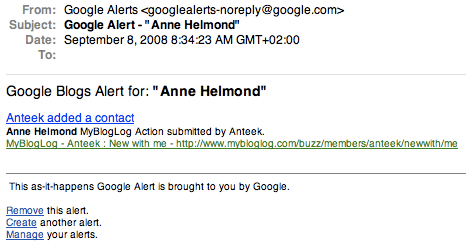For some reason this Google Alert struck me as odd. I previously described how Google Alerts showed me that Google is dividing the web into different spheres, for example the websphere, the blogosphere, the newssphere, the ‘commentosphere’ etc. This Alert however, does not so much seem to point to a specific sphere but to a popular practice within spheres: friending, adding, connecting.
Facebook made this practice clearly visible with the introduction of the News Feed that displayed all your actions for all your friends to see. These actions stay within the walled garden of Facebook and are not indexed by Google.
However these actions now seem to be considered valuable by Google as this Alert from Yahoo!s MyBlogLog shows:
This “friending” within social networking sites is one of its main characteristics and is often perceived to be part of a private sphere. In contrast, for many people, Google is a public sphere. Most social networking sites are not being indexed by Google, except for Twitter if you would (convincingly) argue it is a SNS. Fred Stutzman describes the “Message-centricity, as opposed to Profile-centricity” of Twitter as a way to reconceptualize our common perception of social networks. We could add Action-centricity as a way to describe how publicly exposed actions also play an important role in “locating the network around the profile.”
Google now seems to have moved from indexing public profiles and messages to the public actions that occur within these networks. Google is now expanding its original mission “to organize the world’s information and make it universally accessible and useful” with indexing actions on social networks.
Thanks to Esther Weltevrede for sharing some insightful thoughts on this matter on Skype.

New blog post: Google expands its indexing focus to actions within social networks http://tinyurl.com/6h5yx4
Google expands its indexing focus to actions within social networks: For some reason this Google Aler.. http://tinyurl.com/6h5yx4
@Malarkey hmm food for thought on that topic here: http://tinyurl.com/6h5yx4
Interesting idea.
I noticed the same e-mail coming from services like Last.fm for songs I listened.
Google does already apply time ranges on the news indexed through Google News, and also in Google Blog Search they apply the factor time.
I think they Google should apply time to Social Search as well. Without linear hierarchy the information isn’t as valuable as it could be when ordered chronologically.
You receive the same Alerts for Last.fm? That is very interesting! I immediately going to put a Google Alert on my social networking sites nickname as well and see what else comes up.
Thanks for the great feedback. Time has always been the weak spot of search. Google’s timelime experiment is still in the Lab and it does not seem to be maturing or giving any more useful or accurate results. I think the addition of searching over time would definitely improve the search experience. Well, mine at least :)
Yep, here it is. I’m not sure if the embed code works.
Uploaded with plasq‘s Skitch!
Otherwise this is the link: http://skitch.com/wilbertbaan/iqpd/gmail-google-alert-wilbert-baan-wilbertster-gmail.com
And Vimeo
Uploaded with plasq‘s Skitch!
Link: http://skitch.com/wilbertbaan/iqpe/gmail-google-alert-wilbert-baan-wilbertster-gmail.com
Thanks for the illustrations! I just made some extra Google Alerts so I am curious what they will bring me. I will keep you updated.